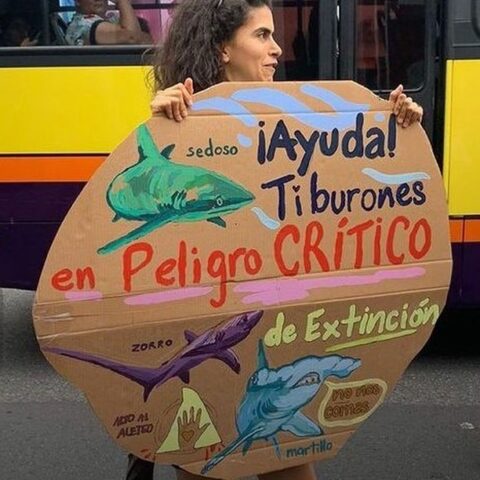The fight to preserve the wildlife of diverse species in Costa Rica, is a worldwide example, due to the admirable effort that every Tico member of organizations, who even present bills, maintains.
With the above, I want to add the constant and special struggle to protect the species of our oceans, whose merit goes to all those men and women experts on the subject, focused on the love and value to the country considered to have an incredible biodiversity.
The protection of sharks is an issue that has been talked about in Costa Rica since 2012, the year in which for the first time reforms to the Wildlife Conservation Law were presented to the Legislative Assembly.
We recently spoke with Randall Arauz, a marine biologist with a Ph.D. in Marine Sciences, who has been working on marine conservation issues since the 1990s and is a member of Marine Watch International.
Arauz told us chronologically and in detail about what happened with the bill in the Costa Rican Plenary.
In his opinion, sharks have always been wildlife, they have always been protected by the Wildlife Conservation Law, – let us remember that this Law, from articles 71 to 80, has a whole chapter that says, “endangered species such as those protected by the Convention on International Trade in Endangered Species of Wild Fauna and Flora known as (CITES), They cannot be traded, it also says that the SINAC is in charge of the International Conservation Conventions for sharks, it is the governing body, and the Conservation Law prohibits the trade of endangered species that are protected by CITES”.
From 2017 to the present
Randall Arauz said that, in May 2017, the former president of Costa Rica, Carlos Alvarado, -under pressure from the fishing sector- created an Executive Decree, “saying that sharks are not wildlife and that then, as they are commercial species, they could continue fishing regardless of what the Wildlife Conservation Law says” he said.
Due to the decree during the mandate of the former president of Costa Rica, Randall and the organizations that accompanied him in the fight, decided to follow a two-pronged strategy: one, was to put the complaint in the Court, due to the -illegality of the decisions-, “an Executive Decree can never affect a Law, however, in Costa Rica that was done, we took that to the Court and, the other was, to address the situation in the Legislative Assembly with a Law so that there would be no doubt that endangered sharks are wildlife, those were the two strategies in 2017”.
In 2019, Arauz and the members of the approximately 40 organizations had everything ready in the office of Popular Initiative of the Legislative Assembly, and introduced the bill (whose file was 21.754) in the Legislative current; in 2020 it entered the Environmental Commission; at the beginning of 2021 it was approved in the Environmental Commission “and supposedly, it was going to the Plenary for a vote, but from there it never passed, it always remained in the Environmental Commission” detailed the Tico biologist.

In 2022, they achieved with the new Government that the project already entered the Legislative stream, “and we were ready for a Plenary vote, we were pressuring them to vote for the Law and it was in 2023, when deputies from Puntarenas pressured the State, all the other deputies, you know how the Legislative Assembly is purely political agreements, then they decided to return the project to the Environmental Commission and that was when we started our campaign to get it out of the Environmental Commission and return it to the Plenary, we achieved it, but the projects only have a life of 4 years and in December they expired when those years expire in the Plenary they have to vote to see if they give it 4 more years, but that was the vote that was lost now and of course, everything was lost there”, emphasized Arauz.
Randall said that the deputies in favor were going to try to reintroduce the bill, “but I have been talking to them and it is like going through the same thing, another six years since we created the initiative”.
The complaint before the Contentious-Administrative Court
Arauz during the conversation with our TCRN team, went back to 2017 when they took the complaint to the Contentious Administrative Court, “we had a hearing in 2021 and after that hearing, we lost it was incredible but our lawyer Walter Brenes appealed the decision and it turns out that, in June 2023, less than a year ago, We won in the Court and the First Chamber of the Supreme Court of Justice is saying that we were right all the time -sharks are wildlife-, after all the years that have passed, and even the Court says -declaring sharks as a commercial species was an act against the legal system and therefore it is declared null and void-, that is, that no longer exists, we won! However, the State still does not give us an answer, that is why we will denounce because the Law must be respected”, he added
For now, Randall suggests following the decision of the First Chamber of the Court, “we will denounce because it is about the conservation of marine species”.

Of interest
✓ The Center for the Rescue of Endangered Marine Species (CREMA), emphasized that the approval of the file would be congruent with Article 75 of the Wildlife Conservation Law and Article 140 of the Fisheries Law, which prohibits the trade of endangered marine species. protected by international conventions.
They emphasized that the three species of hammerhead sharks, the three species of thresher sharks, and the silky shark, which constitute 40% of the Costa Rican commercial catch, are cataloged as endangered or threatened species of coastal marine fauna in the National System of Conservation Areas since 2021.
Environmentalists who are part of the 40 organizations marched last year (2023) for the protection of endangered sharks asking the Legislative Assembly not to let the proposed law die.
✓ Last December 13, the Legislative Assembly rejected to extend the four-year term to file 21.754, which sought to protect threatened or endangered sharks and was ready to go to a vote.
With 23 votes in favor and 20 against, the proposal was shelved because it needed to reach a minimum of 29 votes to extend its stay in the Plenary for four more years. Although a motion for revision was approved, the new vote ended tied at 22 votes, far from reaching the required 29.
✓ In the Environment Commission the deputies in favor of the bill have reminded on different occasions that, neither artisanal fishermen nor the sport fishing industry, fish shark. “This practice they have associated with large industrial vessels that come from other countries and that benefit from indiscriminate shark fishing.”
✓ Finally, the objective of the bill was to modify the fourth paragraph of Article 1 of the Wildlife Conservation Law, to include the prohibition of fishing for those species declared under threat or in danger of extinction by the IUCN or included under the Appendices of the Convention on International Trade in Endangered Species of Wild Fauna and Flora (CITES).


